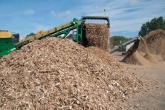An eye on the markets: Knocking on wood
Vicki Hughes, Group Business Development Director at Hadfield Wood Recyclers, provides an update on the recycled wood market.

Over the past couple of years, wood recycling in the UK has come under the spotlight for a number of different reasons.
On a positive note more waste wood is being recycled year on year than ever before, contributing to the UK’s circular economy and enabling the wood recycling market to remain strong.
This can only be a good thing for the environment and for the end users of the sustainable products being manufactured by companies such as Hadfield Wood Recyclers.
It is currently estimated that around five million tonnes of waste wood is being generated in the UK every year. More than half of this is being recycled or recovered by the industry into mainstream products, including feedstock for panel board, animal beddings, arena and play area surfaces and biomass fuel.
Recycled products account for 1.5 million tonnes of waste wood a year. In addition, a further one million tonnes is recovered for use as biomass and around one million tonnes is exported.
However, as predicted a couple of years ago, biomass is likely to transform the UK market shortly with an additional 1.6 million tonnes being required for facilities coming on stream this year.
Our sector is making a significant contribution to the UK’s energy security through biomass produced from waste wood. The Wood Recyclers Association (WRA) estimates 2.9TW of annual domestic power production will be generated when the new facilities are on stream, which is enough to supply 700,000 UK households. 
Yet despite a growing demand for recycled and recovered waste wood products and a growing reliance on the UK’s waste wood biomass sector for supply, the road for wood recyclers is not proving an easy one to travel at the moment.
For more than two years the WRA, along with Hadfield and some other key people in the industry, have been working closely with the Environment Agency (EA) on the issue of Fire Prevention Plans (FPPs). This was a difficult process in which recyclers from many waste streams found themselves fearful of their businesses not being able to remain in operation if new guidance from the EA on storage of materials was enforced.
Currently, our sector is working on a template FPP for wood recyclers to use as guidance. The situation is not yet resolved but we and the WRA are hopeful that there is light at the end of the tunnel which will allow recyclers to continue to operate, and satisfy the EA’s quest for safety on sites.
However, hot on the heels of FPP has come the classification of hazardous waste wood. This is another difficult area in which we are in joint discussions with the EA to come up with a workable solution to reassure the agency that all hazardous waste wood is properly accounted for, whilst avoiding unreasonable and unworkable restrictions that threaten the future of recyclers.
Throughout these difficult processes one thing has been clear: safety and high standards are a priority for recyclers as well as the EA. Enforcement is key, but bona fide recyclers will follow the rules and maintain standards as long as the rules are fair and workable, taking into account the realities of running a recycling site.
 This article was taken from Issue 89
This article was taken from Issue 89Going forward we now need to see stronger enforcement of the ‘cowboy’ operators who, if left to continue operating in our sector and others, will be the downfall of many law-abiding, genuine operators. Hopefully, once both FPP and hazardous waste wood classification have been put to bed, the EA will be able to focus on this worrying area to help the industry succeed even further. 








